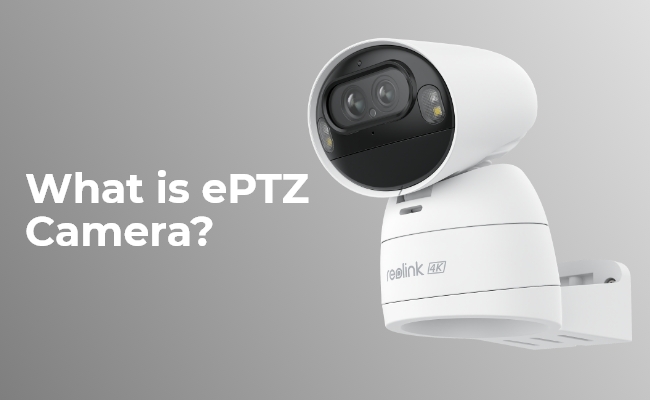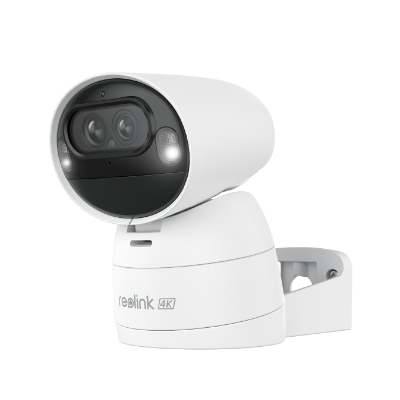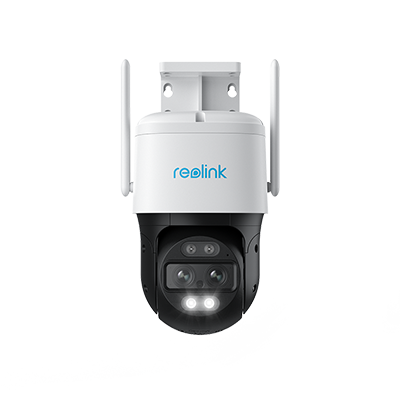ePTZ Camera: Elevate Your Vision

You might be wondering if there are cameras that can seamlessly follow your every move, zooming in and panning across the scene without any physical movement. Yes, it is possible in the world of ePTZ cameras.
Whether securing your home, monitoring your business, or capturing cherished moments, an e-PTZ camera is an essential tool in today's digital landscape. Prepare to elevate your vision and experience a new level of control and precision with this game-changing innovation.
What does ePTZ Mean?
ePTZ stands for "electronic Pan, Tilt, and Zoom," a term that describes the camera's ability to digitally adjust its field of view without the need for any mechanical components. This innovative technology allows you to pan, tilt, and zoom within the camera's captured image, providing a versatile and dynamic viewing experience.
What is an ePTZ Camera?
A digital PTZ camera is a type of digital camera that utilizes advanced software algorithms to simulate the physical movements of a traditional Pan-Tilt-Zoom (PTZ) camera. Unlike mechanical PTZ cameras, which rely on motors to physically rotate and move the lens, electronic PTZ cameras achieve this effect through digital cropping and interpolation of the captured image.
Along with the high-resolution sensors found in modern cameras, electronic PTZ technology can digitally zoom in, pan, and tilt within the captured frame, allowing users to focus on specific areas of interest without compromising image quality. This digital pan tilt zoom capability offers a range of benefits, including improved flexibility, reduced maintenance costs, and enhanced durability.
Types of ePTZ Cameras
The market offers a diverse range of ePTZ cameras to cater to various needs and applications. Here are some of the main types:
ePTZ Camera with Auto Framing
Auto-framing electronic PTZ cameras take convenience to the next level by automatically adjusting the frame to keep the subject in view. These cameras use advanced algorithms to detect and track moving objects, ensuring that the camera's field of view remains centered on the desired target.
4K Camera with Digital PTZ
These cameras boast 4K Ultra HD resolution, providing exceptional image clarity and detail. With their high-resolution sensors, 4K cameras can deliver impressive digital zoom capabilities while maintaining excellent image quality, making them ideal for demanding surveillance scenarios.
Conferenceshot e-PTZ Camera
Designed specifically for video conferencing and collaboration environments, Conferenceshot cameras offer seamless tracking and framing capabilities. These cameras can automatically detect and follow participants, ensuring everyone remains in focus during meetings or presentations.
Electronic PTZ: Pros & Cons
Like any technology, digital PTZ cameras come with their own set of advantages and disadvantages. Understanding these can help you make an informed decision when choosing the right camera for your needs.
Advantages:
- Cost-Effective: These cameras eliminate the need for expensive mechanical components, making them a more affordable option compared to traditional PTZ cameras.
- Compact Design: Without the need for moving parts, ePTZ cameras can be designed in a compact and discreet form factor, making them easier to install and conceal.
- Flexible Viewing Options: With the ability to digitally pan, tilt, and zoom, ePTZ cameras offer greater flexibility in adjusting the field of view, allowing you to capture the desired scene effortlessly.
- Enhanced Durability: With no moving parts, ePTZ cameras are less susceptible to mechanical wear and tear, resulting in increased reliability and a longer lifespan.
Downsides:
- Limited Zoom Quality: While ePTZ cameras can digitally zoom in, the quality of the zoomed image may degrade due to pixel interpolation, especially at higher zoom levels.
- Fixed Lens Limitation: Unlike mechanical PTZ cameras, ePTZ cameras have a fixed lens, limiting their ability to physically adjust the field of view beyond the initial captured frame.
- Limited Field of View: The overall field of view in ePTZ cameras is constrained by the lens's fixed focal length, potentially missing out on capturing a wider area compared to mechanical PTZ cameras.
ePTZ vs PTZ Cameras: What's the Difference?
While digital PTZ and PTZ cameras share some similarities in functionality, there are several key differences that set them apart:
- Movement Mechanism: PTZ cameras rely on physical motors to rotate and move the lens, while e-PTZ cameras achieve panning, tilting, and zooming through digital processing of the captured image.
- Cost and Complexity: PTZ cameras are generally more expensive and complex due to their mechanical components, while electronic PTZ cameras are more cost-effective and simpler in design.
- Size and Form Factor: Cameras with digital PTZ can be designed in a more compact and discreet form factor since they don't require space for moving parts, making them easier to install in tight spaces.
- Flexibility and Range of Motion: PTZ cameras offer greater flexibility in terms of range of motion, as they can physically rotate and tilt to cover a wider area. ePTZ CCTV cameras, on the other hand, are limited by the initial field of view captured by the lens.
- Zoom Quality: While PTZ cameras can achieve optical zoom with minimal loss in image quality, ePTZ security cameras rely on digital zoom, which can result in reduced image clarity at higher zoom levels.
Best PTZ Camera Recommendation
Reolink Argus Track
If you're in the market for a top-of-the-line PTZ camera, the Reolink Argus Track is an excellent choice. This 4K dual-lens Wi-Fi solar/battery camera with auto-zoom tracking offers exceptional performance and feature-rich capabilities.
4K Dual-Lens Wi-Fi Solar/Battery Camera
4K 8MP Ultra HD, Auto-Zoom Tracking, Pan, Tilt & 6X Hybrid Zoom, Color Night Vision, Dual-Band Wi-Fi.
The Argus Track boasts a 4K 8MP Ultra HD resolution, ensuring stunning image clarity and detail. Its pan, tilt, and 6X hybrid zoom capabilities allow you to seamlessly follow and zoom in on moving subjects, capturing every moment with precision.
Reolink Trackmix WiFi
Reolink Trackmix WiFi is a powerful PTZ (pan-tilt-zoom) camera designed for users seeking advanced surveillance with seamless coverage. This dual-lens camera offers both wide-angle and close-up views, capturing every detail with its 4K Ultra HD resolution.
Featuring smart motion tracking, the Trackmix WiFi automatically follows moving subjects to keep them in focus, providing continuous, reliable monitoring. With built-in dual-band Wi-Fi, the camera offers a stable, high-speed connection, while smart detection capabilities for people, vehicles, and pets help reduce false alarms.
4K Dual-Lens PTZ Camera with Motion Tracking
4K 8MP UHD, Wide-Angle & Telephoto Lenses, Pan-Tilt-Zoom, Auto-Tracking, Person/Vehicle Detection, 2.4/5 GHz Dual-Band WiFi, Two-Way Audio.
FAQs
What are the disadvantages of PTZ cameras?
While PTZ cameras offer great flexibility in adjusting the field of view, they come with a higher cost due to their mechanical components. Additionally, PTZ cameras are more susceptible to mechanical wear and tear, potentially reducing their lifespan compared to ePTZ cameras.
What does the e-PTZ stand for?
ePTZ stands for "electronic Pan, Tilt, and Zoom," referring to the camera's ability to digitally adjust its field of view without the need for any mechanical components.
Conclusion
ePTZ cameras offer unparalleled flexibility, convenience, and cost-effectiveness. Whether you're looking to secure your home, monitor your business, or capture precious moments, such camera is an excellent investment that elevates your vision to new heights.
Have you used a digital PTZ camera before? What features do you find most appealing or lacking? Your feedback and insights can help shape the future of video surveillance and monitoring.
Search
Be in the Know
Security insights & offers right into your inbox


